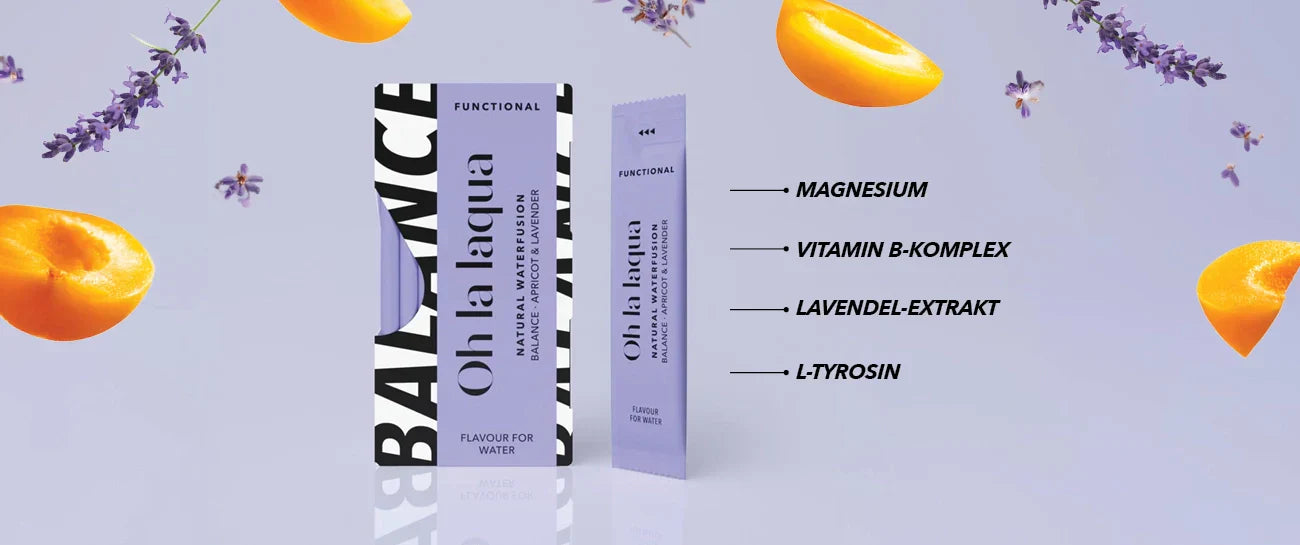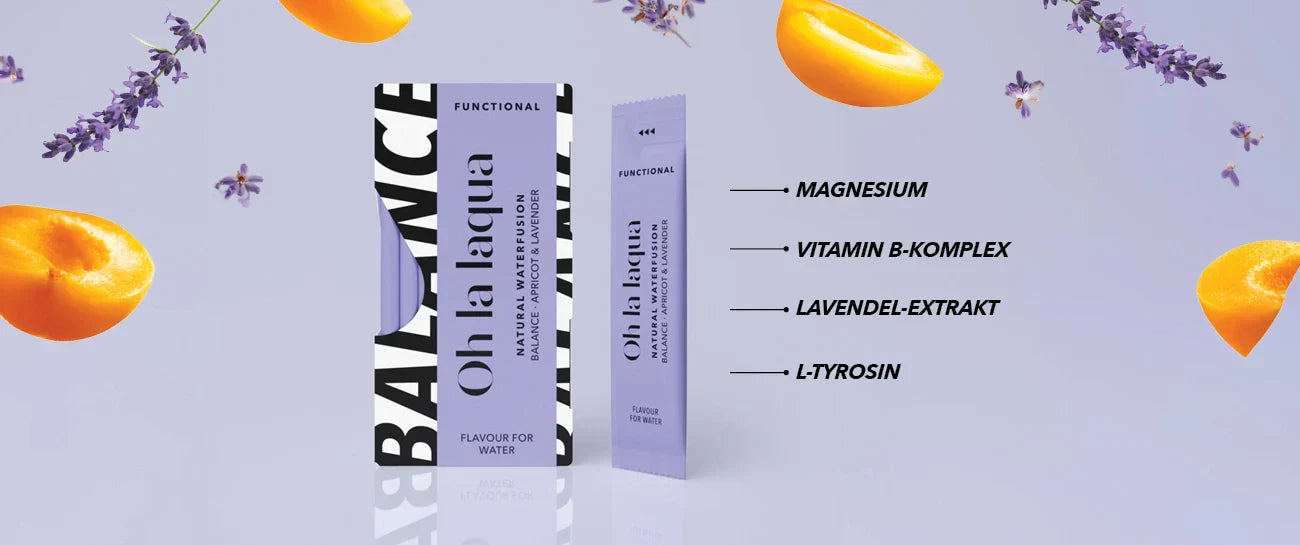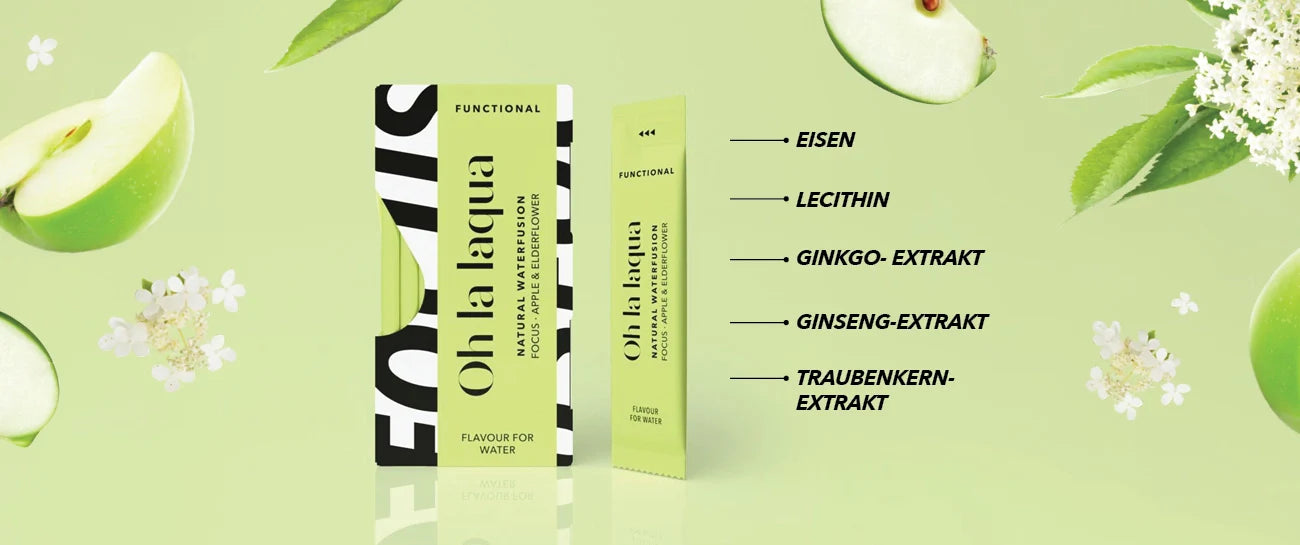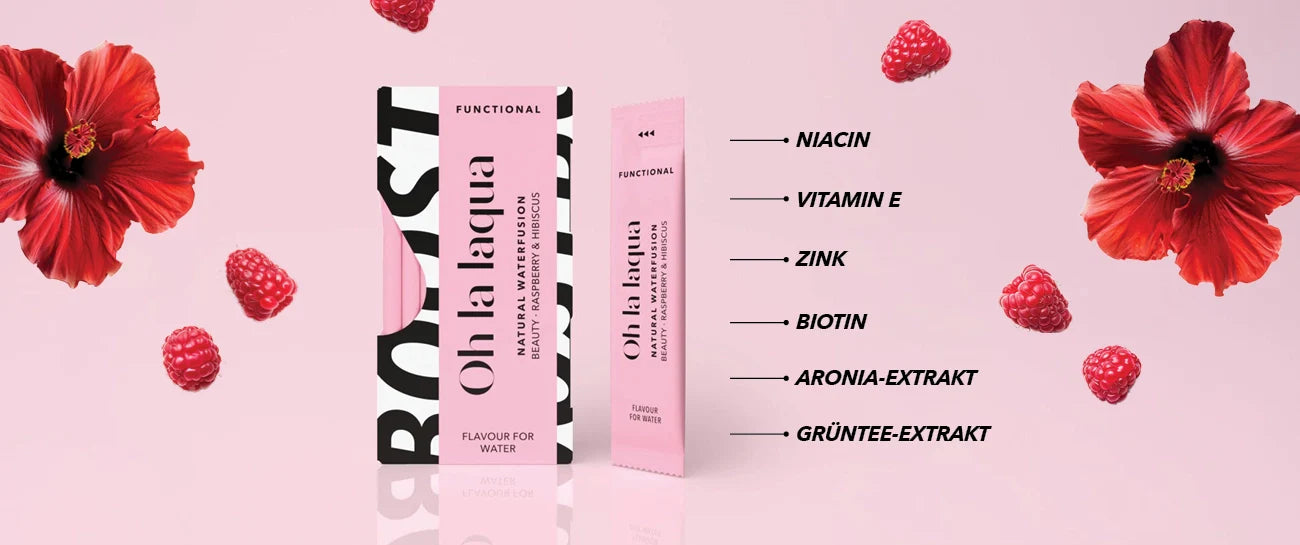In a world where stress and feelings of overwhelm are on the rise, people are looking for simple ways to regain their inner balance. One innovative approach is to drink functional water, which is not only hydrating but also specifically enriched with ingredients to maintain normal mental function.
One of these drinks is the Functional Water OH LA LAQUA Balance with apricot-lavender flavor. In addition to magnesium, it also contains lavender extract, L-tyrosine and a special vitamin B complex made from buckwheat germ powder with a total of eight B vitamins, including vitamins B6 and B12. They contribute to inner balance by having a direct effect on our metabolism, nervous system and the production of neurotransmitters, which influence our emotional well-being.
Vitamin B12 is also essential for energy metabolism, the formation of blood cells and the maintenance of protective nerve sheaths. As the human body cannot produce this vitamin itself, it must be obtained from food. It is mainly found in animal products such as meat, fish, eggs and milk, which are only consumed in moderation by vegetarians and not at all by vegans. Vitamin B12 is released in the digestive tract with the help of stomach acid and digestive enzymes. It then binds to a special transport protein, the so-called "intrinsic factor", which transports it to the cells of the small intestine. From there, the vitamin is absorbed into the blood and transported to the nerve cells.
Why should people with diabetes, vegetarians and vegans in particular take vitamin B12 in addition to a healthy diet?
Vitamin B12
- For people with diabetes:
Vitamin B12 is important for the function of nerve cells. A deficiency can cause neurological symptoms such as tingling, numbness or even nerve damage. People with diabetes, especially type 2 diabetics, have an increased risk of neuropathies (nerve damage caused by diabetes). A vitamin B12 deficiency can exacerbate this damage.
Vitamin B12
- For vegetarians:
Vitamin B12 is found almost exclusively in animal foods, such as meat, fish, eggs and dairy products. Vegetarians who do not eat meat and fish may have difficulty getting enough vitamin B12.
Vitamin B12
- For vegans:
Vegans completely abstain from animal products and therefore consume practically no vitamin B12 in their diet. Plant-based foods such as algae or fermented products either do not contain sufficient amounts of vitamin B12 or contain forms that are not usable by humans.
It is advisable for diabetics, vegetarians and vegans in particular to have their vitamin B12 levels checked regularly and to take appropriate measures if necessary, such as taking supplements.
How can a vitamin B12 deficiency occur?
A vitamin B12 deficiency can be caused by various factors. Often there is a lack of intrinsic factor, a special protein that is essential for the absorption of vitamin B12 in the intestine. Chronic inflammation of the stomach or intestines, such as gastritis or Crohn's disease, can also impair absorption. In addition, certain medications, such as those for diabetes (like metformin) or drugs to reduce stomach acid, can inhibit the utilization of vitamin B12. Regular alcohol consumption also has a negative effect on absorption.
A deficiency is particularly common in people who follow a vegetarian or vegan diet, as vitamin B12 is found almost exclusively in animal foods. With increasing age, the function of the digestive tract also deteriorates so that vitamins, including vitamin B12, can be absorbed less efficiently.
What physical symptoms indicate a vitamin B12 deficiency?
The body has large stores of vitamin B12 in the liver, which is why a vitamin B12 deficiency often only becomes noticeable after several years of deficiency and is then difficult to recognize or attribute. Not least because the symptoms of a vitamin B12 deficiency are varied and often unspecific:
- Sensory disorders up to and including paralysis
- Tingling in arms, legs and feet
- Burning tongue
- Gait instability and increased tendency to fall
- Muscle weakness
- Tiredness and lack of concentration
- Memory disorders
- Headache
- Depression
- Confusion
- Hair loss
- Anemia
How exactly can functional water like OH LA LAQUA Balance help us to regain our balance? And what else can we do to relax and find our center?
The power of ingredients: What is in Functional Water OH LA LAQUA Balance?
Magnesium: the anti-stress mineral
Magnesium is essential for muscle relaxation and nerve function. It helps to reduce stress and improve sleep, which is particularly important during stressful periods. You can get it naturally from pulses, nuts and seeds, wholegrain products, green leafy vegetables, but also from fish (especially mackerel and salmon) and dairy products.
Lavender extract: the calming companion
Lavender is known for its relaxing properties. This is why it is often an ingredient in herbal teas or relaxing baths. Whether in liquid form or as a fragrance - lavender can alleviate restlessness, reduce anxiety and contribute to a better quality of sleep.
L-tyrosine: support for focus and mood
L-tyrosine, an amino acid, plays a key role in the production of dopamine and noradrenaline - both neurotransmitters that are important for mood and concentration. Balanced dopamine levels can help you stay optimistic and productive. You get L-tyrosine from meat, fish, dairy products and eggs. For vegetarians and vegans, soy products, pulses, nuts and seeds, cereal products and not forgetting avocados and bananas are suitable: Avocados and bananas.
Vitamin B complex from buckwheat germ powder
The vitamins B1, B2, B3, B5, B6, B7, B9 and B12 from buckwheat sprouts promote energy metabolism and support nerve function. They are essential for many physical and mental processes.
The benefits of a functional water for your balance
The targeted combination of these ingredients has a synergistic effect: magnesium relaxes, lavender calms, L-tyrosine strengthens mental resilience and the B vitamins replenish energy reserves. The fruity, floral taste of apricot & lavender also provides a moment of pleasure - a small but effective way to take a break from everyday life and wind down.
What else can you do to get back into balance?
Small steps can help you to regain your balance: daily walks in the fresh air, even if it's only 15 minutes, promote a sense of well-being, and light stretching exercises in the morning can relieve tension. Make sure you drink enough water, this alone often provides more energy.
Further tips for getting back into balance
- Reduce stress by simplifying your to-do list and focusing on one to three important tasks a day.
- A regular sleep routine helps to relax body and mind.
- Conscious breaks promote well-being.
- Breathing exercises such as consciously breathing in and out in a calm rhythm quickly calm the mind.
- Make time for gratitude and positive contact every now and then.
- Limit stressful media consumption and treat yourself to relaxing moments in nature or with a hobby.
- Make sure you eat light, conscious meals and practice mindfulness in everyday life.
- Praise yourself for your progress, even if it seems small - this boosts your self-confidence.
With these simple approaches, you can bring more balance into your everyday life step by step without putting yourself under pressure - small steps make all the difference. And another thing: a conscious smile, even for no reason, relaxes your body and mind.





